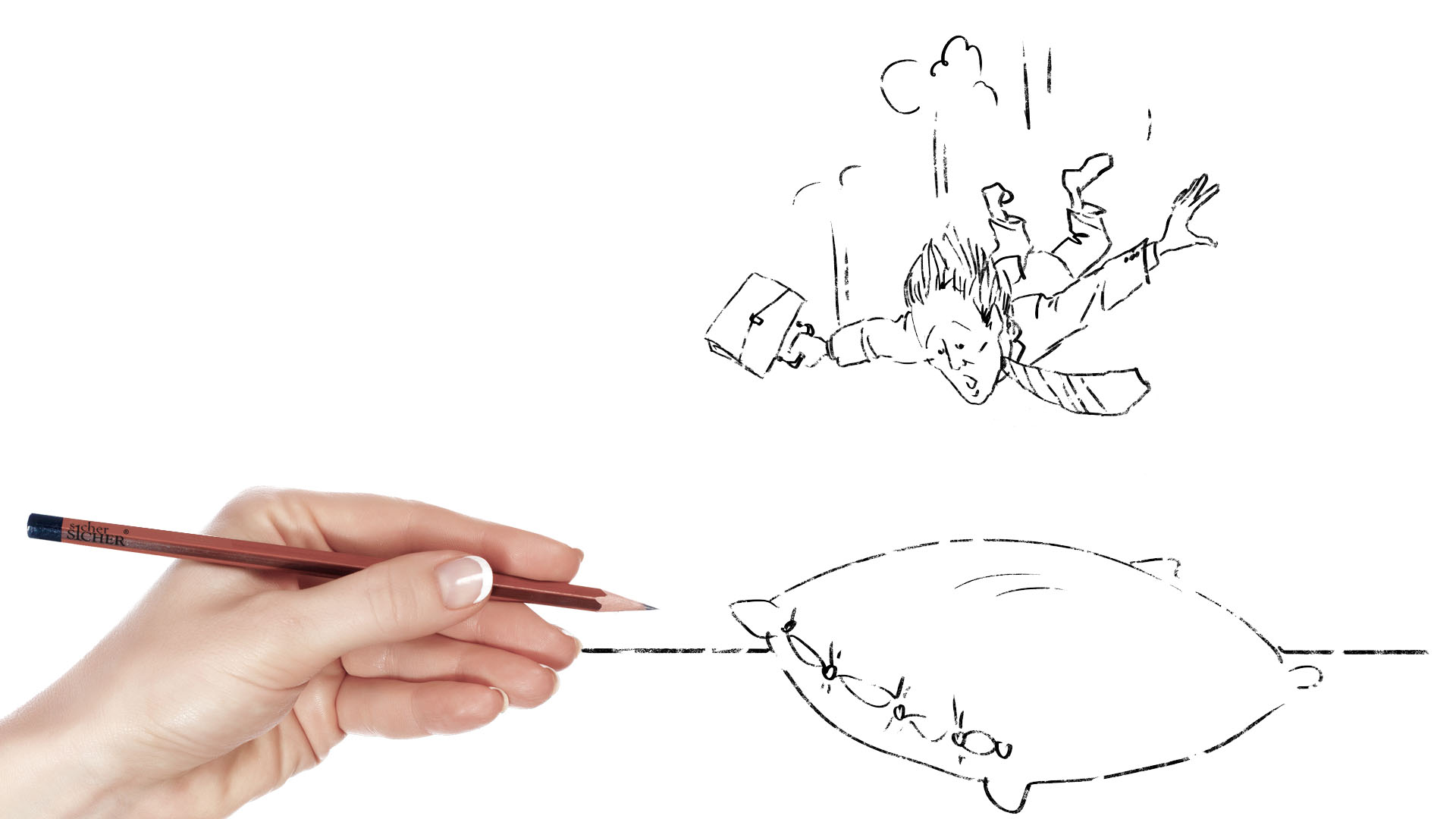What is private liability insurance?
Whether through carelessness, mishap, or forgetfulness, anyone who causes damage must take responsibility for it. Dieses is regulated by law in Germany, based on § 823 BGB (German Civil Code). The party responsible for the damage must compensate the injured party, which often leads to financial consequences. In the worst case, the person who caused the damage is liable for their house and property, bank balance, salary, and beyond. Even a later inheritance or lottery winnings can be accessed. The perpetrator is liable for the damage with all their assets—in extreme cases, to the point of financial ruin.
It is recommended to have private liability insurance since the benefits in comparison to the risks covered in relation to the economical annual fee premium speak for themselves.
This coverage is often demanded by landlords since it covers the costs of damages to rented apartments or houses by the tenant. Private liability covers a wide range of perils and protects the insured against financial losses inflicted by third parties worldwide.
- What is private liability insurance?
- What does private liability insurance cover?
- Defence against unjustified claims (‚passive legal protection‘)
- Who is covered by private liability insurance?
- How long are children insured through their parents?
- How long are children insured through their parents?
- Au pair and semester abroad: How about the insurance cover?
- Liability for pets: Who pays for the damage?
- Dog owner liability insurance
- Horse owner liability insurance
- What private liability insurance does not cover
- Does private liability insurance compensate for the actual new value of a damaged item?
- Does private liability insurance also pay for damage caused by small children?
- Does the liability insurance pay for any damages caused when I help a friend move apartments?
- The camera borrowed by a friend falls and breaks—no problem, because my private liability insurance pays?
What does private liability insurance cover?
Private liability insurance protects the insured person and their family against claims for damages. It provides more than just compensation for material damage. Firstly, personal private liability insurance checks whether and to what extent there is an obligation to pay compensation.
The benefits of private liability insurance briefly*²:
- The costs of restoring or replacing the damaged items.
- The costs of consequential damage, such as loss of use
- For injured people:
- Rescue costs
- Treatment costs
- Loss of Income
- Remodelling of a flat or house
- Often also compensation for pain and suffering or, in the case of permanent damage, a lifelong pension.
*² For clarification: The benefits listed above are for third parties, not for the insured. Private liability covers the losses of third parties and takes over these financial demands, so the insured does not pay themselves.
For an offer, please fill out the form.
Defence against unjustified claims (‚passive legal protection‘)
Liability insurance defends against claims for damages that are unfounded. If such a case leads to a legal dispute with the person claiming compensation, the liability insurer takes over the case and bears the costs. Liability insurance, therefore, offers a kind of ‚passive‘ legal protection in the event of unjustified liability claims against their clients.
Who is covered by private liability insurance?
The insurance initially protects the contract holder. He or she is the contractual partner and therefore has all rights and obligations arising from the insurance contract. The private liability insurance also includes:
- Spouse/life partner: Even if there is no marriage, the insurance coverage can usually be extended to the life partner. To do this, the name of the partner must be included in the contract.
- Children (see below for more details)
- Household/garden helpers or babysitters: They are covered by the liability insurance of their employer (the insured family). For example, if the babysitter is looking after the children and injures a neighbor through negligence, the family’s insurance will pay.
- In the event of death, if the insured person dies, the insurance coverage for the dependents continues until the next premium payment. If the surviving partner pays the next premium, he or she automatically becomes a contractual partner and continues the existing personal liability insurance.
How long are children insured through their parents?
A common question about personal liability insurance is: What coverage do children have under their parents‘ insurance, and when exactly do they need their own?
Children are generally covered by their parents‘ liability insurance if they are under the age of 18 years old. The insurance coverage ends when they get married. Regardless of their age, children continue to be covered by their parents‘ liability insurance as long as they
- going to school.
- are doing their first professional education (apprenticeship or studies).
- are in the usual waiting periods between school, work, and studies.
Children who have completed their first degree of study or apprenticeship and then change direction (e.g., through a second course of study or apprenticeship) are no longer covered by their parent’s insurance. In this case, they need their own liability insurance. The same applies if the kid either joins the armed forces after school or starts to work right away.
What applies during training and voluntary service?
For trainee lawyers and trainee teachers, insurance coverage usually ends with the first state examination. If your son or daughter completes a federal voluntary service (usually lasting 12 months), the insurance cover remains in place via the parents‘ private liability insurance.
Au pair and semester abroad: How about the insurance cover?
The insurance cover of private liability insurance abroad is limited in time and only applies to temporary stays abroad. The specific periods insured depend on the respective insurer and tariff.
Liability for pets: Who pays for the damage?
Damage caused by tamed small animals such as cats, guinea pigs, or budgies is covered by the owner’s private liability insurance.
However, if you keep a dog or a horse privately, the cover provided by private liability insurance is not sufficient. There are separate liability insurance policies for these animals.
Dog owner liability insurance
Even a peaceful dog can cause serious personal injury or property damage, for example, if it breaks free and runs onto the road, causing an accident with swerving cars. In cases of this kind, dog owners therefore need additional dog owner’s liability insurance.
Horse owner liability insurance
Horse owners need animal owner’s liability insurance. Anyone who rides out on a horse borrowed from a riding school or a friend, for example, if the horse shies and injures someone. Private liability insurance coverage does not include liability claims from the owner of the horse, for example, if the animal is lame after a ride.
What private liability insurance does not cover
Insured persons do not receive any benefits for damage that they suffer themselves or that they inflict on each other. The liability insurance does not cover, for example:
- Damage caused intentionally.
- pure contractual obligations, such as the right to repayment of a loan
- Fines and penalties
- Damage caused by a motor vehicle. This is covered by motor vehicle liability.
- Damage caused by a watercraft or aircraft. There is special liability insurance for these kinds of risks.
Here are the following answers to common questions about private liability insurance:
Does private liability insurance compensate for the actual new value of a damaged item?
No, it does not. If possible, damaged items will be repaired. The insurance then covers the full cost of the repair. The insurance only pays compensation if a repair is more expensive than the time value; the private liability insurance compensation is based on the time value.
This is calculated by deducting use, wear and tear, and any damage from the replacement value. This is often complex, sometimes even impossible. Therefore, insurance companies often use an average assumption of the lifetime of the damaged item to determine its time value. There is often a downturn for the victim or effected owner with the time value: he or she does not get enough money to buy the damaged item again.
However, there are, of course, tariffs in the market that also insure the replacement value (new value), so you would save discussions with the victim in the event of a claim. But it is worth mentioning that this new value often has a limit. Common limits are at around 2.500 €, so only claims and damages up to that amount will be paid; any amount above will be reimbursed according to the time value.
Some providers are suspiciously cheap, and a report by the German federal cartel authority (Bundeskartellamt) is proving that these offers have almost no insurance protection and include contract clauses that are not customer-friendly and contrary to usual market practice. Reference
Does private liability insurance also pay for damage caused by small children?
No, usually it doesn’t. Private liability insurance often protects not only the client but also his or her family. What surprises many parents, however, is that private liability insurance does not pay for damage caused by children under the age of seven.
The reason is based on German law. Children under seven years old are never legally liable themselves, according to They are legally considered incapable of recognizing the scope and consequences of their actions.
It is therefore important to check carefully before buying insurance if you have kids under seven to see whether the insurer pays for damages caused by children under the age of seven and until which insurance sum. The legal age limit is even higher for damage in flowing road traffic: children are not liable until they are ten years old. On the contrary, if a child scratches a parked car, for example, the insurance company must pay compensation, even if they are seven, eight, or nine years old.
In individual cases, parents can be held accountable for damage caused by their child, namely if they have violated their duty to supervise. Then they are not liable for their children but for their own misconduct, for not having adequately supervised their kids. Private liability insurance pays the claims based on breaches of supervision.
Does the liability insurance pay for any damages caused when I help a friend move apartments?
No, generally, it doesn’t. Because voluntary moving helpers such as family members and friends do not have to reimburse for the damage if they join the move out of sheer complacency and accidentally break something. Courtesy means helping someone without getting money or other kinds of reimbursements. Liability for helpers is implicitly excluded.
Exception: The voluntary removal assistant must compensate for the damage if he acts with gross negligence, i.e., intentionally violates his duty of care. Examples: A woman accidentally drops the moving friend’s computer; she is not liable.
However, if she is drunk and drops his computer, she is liable because she has violated her duty of care and thus also her private liability insurance, provided that gross negligence is covered. Note: Alcohol is also in the insurance sector; it is not a solution to problems or getting claims paid. In most cases, it will also lead to further problems. However, the damage of courtesy and also damage within relatives and co-insured family members can be covered.
The camera borrowed by a friend falls and breaks—no problem, because my private liability insurance pays?
Not necessarily. Whether the insurance pays for borrowed items depends on the tariff. As a rule, damage to loans is treated like damage to one’s own property. And if someone breaks their own property, they cannot turn to their private liability insurance for reimbursement. But there are tariffs for private liability insurance that offer protection for borrowed items. Generally, the insurance compensation amount is limited, or a deductible is in place.
To get an offer, please fill out the form.

